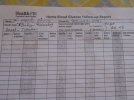Lynnzhealth
Well-Known Member
- Messages
- 162
- Type of diabetes
- Type 1
- Treatment type
- Insulin
I'm sorry to hear that. I got quite a shock thinking I was T2. Then to find out it's actually T1. WOW! I'm now 75 and I still ask myself that. I can't say that I like the limitations any better now. I don't know that I have any tips for you since I still have my emotional spells. They could be caused by the ups and downs because it plays havoc with one's whole system. However, I can tell you some things that I do.I was really interested to read your post even though it was from a while ago. I was diagnosed as type 2 diabetic just after Christmas this year but within a month and with BG readings of 33 +, my antibody tests came back as type 1 - all at the age of 72, and am on insulin 4 times a day with BG readings (meant to be) 7 times a day. As a needle phobic I am shocked, angry and distraught and can’t face the thought of doing this for the rest of my life. I ask myself if I will ever accept all the limitations. Any tips for coming to terms with it all please?
I have to be very careful when I walk the dog. I never know if my BG is going to go up or down, so I have to be sure to have supplies with me at all times. No more leaving the house just for fun. I get very frustrated with that. Life is definitely not the same for sure. I take shots 4 times a day, too.
Are you on the monitor/sensor system? I have the Freestyle Libre 2, so I can check my BG as often as I want. One problem is that I don't always feel the hypos unless they get to the danger zone. I don't want the hypers, either. That's when the organs start to get compromised. I can't afford that because I only have one kidney.
One thing I have done and still do is keep track of every meal, BG and dose each and every day because that sometimes helps me figure things out. I might be OCD, but I'd rather be safe than sorry. Although some days it all seems to have a mind of its own. That's the frustrating part. I have attached a photo of the sheet I use to keep track. I got it from my Diabetic Educator and photocopy it when I run out.
Another thing that I find is that I can't walk very far if the day is humid. My BG drops like a rock. And, I when it's cold out it normally rises. A few times it has dropped. It's so confusing to try to keep up with it.
There is a blog I follow where I get good information (LetMeBe83...) and I read or watch Youtube videos from Doctors who have it or whose kids have it. Very informative. Have you read Dr. Richard Bernstein's book "The Diabetes Solution"? He got it when he was around 12, decided to become a doctor at 45 (he was an engineer) because he couldn't get any information about diabetes and how to control it. He is now 89 or 90. So, I would rather take his advice than from doctors who don't have it. They don't know how it feels, but I definitely do.
I better stop now because it's a lot and could give you brain overload. I hope you can get some good information and get a handle on this. Hopefully, some of this helps you.

Take care of yourself.
